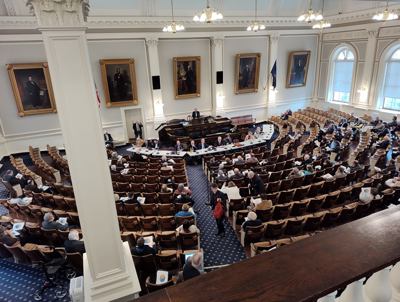In the preview for a final showdown set for Thursday, House Democrats launched tough questions and sometimes angry comments at Republican budget writers during a briefing on the two-year, $15.4 billion state budget proposal. House Finance Committee Chairman Ken Weyler urged his Republican colleagues to stick together and adopt a plan that has $640 million less in spending than Gov.
Kelly Ayotte had proposed, $325 million less from state taxes and fees. “There are things in it I don’t like but I have a responsibility to pass this budget,” Weyler said. He pointed out his panel put into the trailer bill to the state budget ( HB 2 ) 29 different pieces of separate legislation to strengthen the House’s hand in negotiating a final spending plan with the state Senate.

“It would be a folly to vote against this,” Weyler said. House Democrats and activist groups are planning a noontime rally Wednesday to mobilize opposition to the budget. The House Freedom Caucus, a fiscally conservative group, sounded the alarm last week about its view that the House budget had too-rosy estimates for future revenues.
The House Ways and Means Committee’s estimates for taxes and fees were about $500 million less than Ayotte’s for the two-year cycle that concludes June 30, 2027. Rep. Wendy Thomas, D-Merrimack, confronted Rep.
Dan McGuire, R-Epsom, who led the charge to take $20 million sitting in a Renewable Energy Fund to help balance the budget. “You are gutting or stealing this money the ratepayers had paid into with the requirement that it be spent on renewable energy initiatives,” said Thomas, predicting the state will be sued over this change. McGuire interjected, “And your question is?" Thomas shot back, “I guess my question is how do you sleep at night gutting New Hampshire’s energy future?” As McGuire laughed in response, Rep.
Jess Edwards, R-Auburn, scolded Thomas for the confrontation and appealed to Weyler to restore order. "Can we encourage people to use proper decorum in these proceedings?” Edwards said. “That is an improper question and you should retract it.
” Thomas responded, “I will not retract it.” McGuire said the budget borrowed many dedicated funds to balance the books. The plan also would impose a new 5% assessment (some critics brand it to be a new tax) on most of these funds to raise another $16 million in 2027.
Ayotte’s budget plan proposed taking half the renewable energy balance. Once the fund is drained, the House trailer bill adopts a House-retained bill ( HB 224 ) to have all future assessments returned to ratepayers rather than spent on renewable energy projects. Several House Democrats criticized cutting $14 million in state support for tourism advertising, which still would leave it with a $4 million annual budget.
“The state should be in the business of economic development and that’s just what this tourism money is,” said Rep. Hope Damon, D-Sunapee. McGuire said it’s another form of corporate welfare.
“We are spending this money to benefit one specific industry. The industry can spend their own money to do their own advertising,” McGuire said. Rep.
Keith Erf, R-Weare, said the plan alters the education aid formula to bring back “fiscal disparity” grants based on a town or city’s property wealth per capita. Two years ago, lawmakers got rid of those grants in place of “extraordinary needs” that combined property wealth with the number of children getting a free or reduced school lunch as the latter is a proxy for income wealth. "This had an outsized effect on certain cities," Erf said.
The 2023 change gave Manchester a 36% or $30 million increase in its annual grant last year. Under existing law, Manchester’s grant would go up another $12 million in 2027 for a 49% total increase from 2023. This proposed budget would not provide that future hike and instead impose a cap to what Manchester is currently receiving plus a 2% annual increase.
Rep. David Luneau, D-Hopkinton, said the House GOP budget helps 40 property-poor towns, but said there are 100 that should qualify for some additional assistance. klandrigan@unionleader.
com.
Politics

NH House budget briefing gets chippy in advance of showdown vote

In the preview for a final showdown set for Thursday, House Democrats launched tough questions and sometimes angry comments at Republican budget writers during a briefing on the two-year, $15.4 billion state budget proposal.















